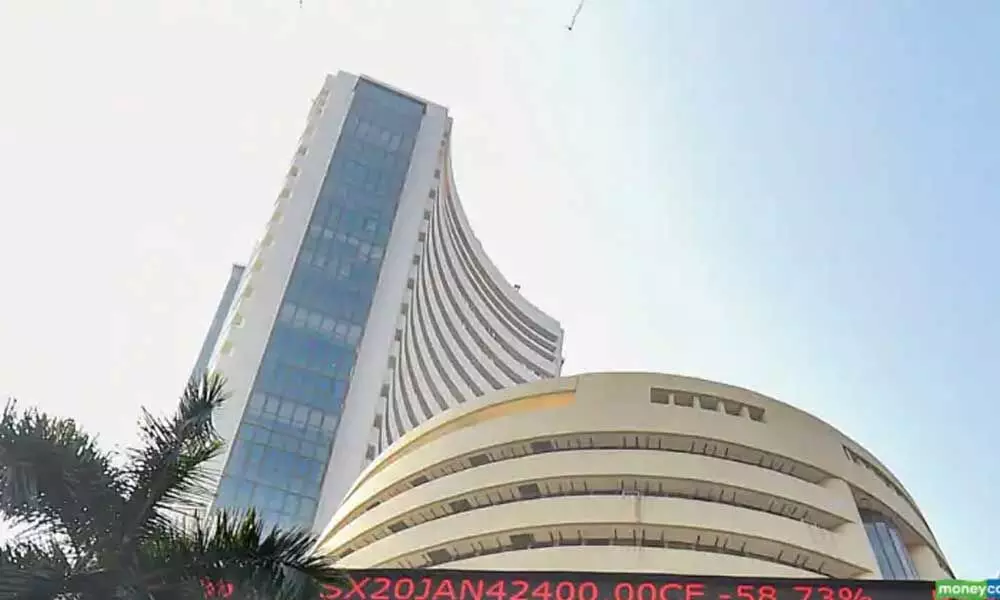Q1 earnings holding market; all eyes on RBI meet

BSE Sensex
Weak global cues and consistent selling by FIIs kept market under pressure for the second consecutive week. US Federal Reserve’s Dovish policy helped market recoup some losses in the latter half of the week.
Weak global cues and consistent selling by FIIs kept market under pressure for the second consecutive week. US Federal Reserve's Dovish policy helped market recoup some losses in the latter half of the week. The BSE Sensex fell 388.96 points (-0.73 percent) to close at 52,586.84 poins, while the NSE Nifty was down 93.05 points (-0.58 percent) to end at 15,763 levels.
Broader markets outperformed benchmarks, with BSE Midcap and Smallcap indices gaining 0.29 percent and 1.36 percent respectively. FIIs continued to be net sellers in Indian equities for the fourth consecutive month in July, offloading Rs 23,193.39 crore, the highest since March 2020. However, DIIs continued to support the market with net buying of Rs 18,393.92 crore in July, the highest monthly buying since March 2020. On the back of the strength in US and other developed markets, it is pertinent to observe that emerging markets have been witnessing sharp selling from FIIs for last few weeks. Monetary Policy Committee (MPC) of RBI will be meeting during the course of next week. Observers expect the RBI to hold interest rates, but the commentary on economic growth and inflation trajectory along with measures for most-affected sectors (if any) will be keenly watched out for. US Fed left their stance on monetary policy unchanged at the conclusion of a two-day policy meeting.
With the 'Pegasus' issue disrupting the Parliament proceedings, no major Bills were introduced. Near-term direction of the markets will be dictated by RBI Policy meeting, developments in Parliament, macroeconomic data, international crude oil prices and Q1 earnings numbers. Corporate earnings have generally been strong, easing concerns that the stock market is overvalued. Clutch of PSU banks like State Bank of India (SBI), Punjab National Bank (PNB), Bank of Baroda (BoB), Bank of India (BoI) and Indian Overseas Bank (IOB) will unveil their Q1 numbers.
Prominent corporates like HDFC, Bharti Airtel, Titan, Dabur, HPCL, M&M, Nalco, Cipla, GAIL India, Adani Ports, Hindalco, and Divi Labs will also announce their numbers in the coming week.
Heard on the Street: Investor behaviour has been the focus of many studies and numerous theories attempt to explain the regret or overreaction that buyers and sellers often experience when it comes to money. The reality is that the investor's psyche can overpower rational thinking during times of stress, whether that stress is a result of euphoria or panic. Taking a rational and realistic approach to investing—during what seems like a short time frame for capitalizing on euphoria or fearful market developments—is essential. The non-professional investor is typically putting hard-earned cash in investments for the sake of receiving a return.
Still, they see their investments lose value due to market developments at times. The losses can cause stress and second-guessing. That is, many investors have a relatively low risk tolerance when it comes to investing because losing money is painful. But risk can be viewed as a guidepost for investing and investor behaviour. Investors who enter into investments with a base level understanding of the risks involved can mitigate a great deal of the emotion associated with investing. In other words, challenges due to emotional investing can crop up when investors see unidentified or higher stake risks than they had originally ascertained. Emotional investing is often an exercise in bad market timing. Following the media can be a good way to detect when bull or bear markets are evolving because the daily stock market reports feed off the activity occurring through the day, which can at times create a buzz for investors. However, media reports can also be outdated, short-lived, or even non-sensical and based on rumours.
F&O/ sector watch
True to predictions, the settlement week witnessed heightened volatility with intraday Nifty moves of over 200 points in some sessions. However, it can be seen that the July series has been one of the most boring series with the Nifty trapped in a slender range of 500 points. Rollover in the Nifty and the Bank Nifty stands at 82.75% and 81.20% respectively, well above 3-month average of 76%. Market wide rollovers stood at 91% (last month's market wide 92%). With the new series only one session old, option data is scattered at various far strikes. Maximum Put open interest was seen at 15,700 followed by 15,800 &15,500 strikes, while Maximum Call open interest was seen at 15,900 followed by 15,800 & 16,000 strikes.
Keep an eye on PSU banks say industry watchers. Banking sector holds the key for any directional move going ahead. The uncertainties brought in by the pandemic helped spur the demand for life insurance players. The first year premiums for the industry spiked 6.9 per cent (Y-o-Y) in June quarter. Maruti Suzuki, TVS Motor, Tata Motors, Eicher Motors, Bajaj Auto, Ashok Leyland, M&M and Escorts will be in focus.
Stock futures looking good are Bharti Airtel, Hindalco, L&T, GMR Infra, NMDC and UPL. Stock futures looking weak are Bajaj Finserv, HUL, Kotak Bank, Maruti and Metropolis.
(The author is a stock market expert. He is former vice chairman of AP Planning Board)








